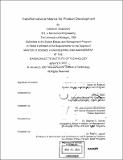Transformational metrics for product development
Author(s)
Robison, Dawn M., 1967-
DownloadFull printable version (12.91Mb)
Other Contributors
System Design and Management Program.
Advisor
John C. Miller and Joel Cutcher-Gershenfeld.
Terms of use
Metadata
Show full item recordAbstract
The research provides a case study of performance metrics within the framework of the product development process and team effectiveness. A comparative analysis of eight product development teams was done to evaluate the teams' effectiveness in achieving three outcomes - customer satisfaction, shareholder value and time to market. A survey was conducted to evaluate areas where no formal documentation existed and to supplement the existing historical data that were collected from databases and documents. The analysis was done on two levels - by program team and individual respondent - and looked at the level of performance and effort that influenced the specific outcomes. It was concluded that performance metrics are used within an organization to drive actions, to assess progress and to make decisions. Conclusions were consistent with the premise that people perform to how they are measured and that the team effectiveness can be driven by a set of performance metrics that are aligned with the strategic goal of the organization. Transformational metrics were developed within the framework of understanding the interdependence of the social and technical systems. Choosing the right metrics is critical to an organization's success because the metrics directly influence behavior and establish the culture within the firm. It was determined that if the right combinations of metrics are selected, teams will act in such a way as to maximize their effectiveness and behave in a manner that achieves the corporate goals.
Description
Thesis (S.M.)--Massachusetts Institute of Technology, System Design & Management Program, 2001. Includes bibliographical references (p. 113-116).
Date issued
2001Department
System Design and Management Program.Publisher
Massachusetts Institute of Technology
Keywords
System Design and Management Program.